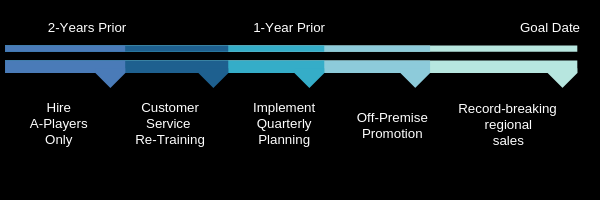“A company — and a region or territory — has a lifecycle that ages,” says Jim Sullivan in Multi-Unit Management. “Infant, youth, adult, middle age, maturity. Each stage of this growth curve brings with it different leadership, knowledge and resource needs based on a company’s maturity and growth stage.”
Leadership is situational, and like a sports coach, Franchise Business Coaches (FBCs) need different playbooks for different situations. Below, find seven experienced-based tips on setting franchise goals from leaders in the franchising community.
1. Think Big When Setting Franchise Goals
According to Harvard Business Review, “High goals generate greater effort than low goals, and the highest or most difficult goals produce the greatest levels of effort and performance.” This is based on research by professors Edwin A. Locke and Gary P. Latham, two of the best known academic researchers on goal-setting. Their 35 years of research revealed that specific, difficult goals with tight deadlines consistently led to higher performance.
2. Work Backward From Your Goal
Visualization is a powerful tool in goal-setting. Imagine the world two years from now, when the goal has been achieved. What steps did you need to get there?
It’s not about just looking (and being) busy. Many FBCs are going 100 miles per hour in every direction. Sure, they may look busy — but at the end of the day, many aren’t getting things done and their regions are going nowhere fast. Work smart and not hard. Figure out the end game and determine the best path to get there.

3. Understand Your Franchisee’s Ecosystem
Context is key to help your franchisees in their goals. “To consistently be a goal-getter, multi-unit managers should always consider how a policy or procedural change brought about by new policies, technology, competition, marketing, diversity and in-store leadership (or lack of it) will affect the internal eco-systems of each store,” says Sullivan. “An ‘environmentalist’ MUM clearly understands the unique inter-connectedness of people and processes at each store they supervise and how modifying one facet of its eco-system (equipment, training, talent, policy, procedure or resources) might positively or adversely affect other facets of operations.”
4. Hit Financial Targets by Conveying the Big Picture
Set your franchisees up for success by sharing the “why” behind the “what.” A real leader will help build their replacement, instead of trying to make themselves one of a kind. Teaching others will create a culture of excellence and continuous improvement across the organization.
5. Pay Attention to the Little Things
As Walt Disney developed his theme parks, he wanted to create a magical experience for people who came to the park — especially after his family’s own disappointing experience on a carousel with broken-down horses that didn’t move up and down.
“It is said he had a hand-painted sign over his desk that read ‘No Chipped Paint. All the Horses Jump.’” says Sullivan. “The little things mean a lot; don’t compromise your standards, know your non-negotiables, and never underestimate the importance of the mundane.”
6. Embrace Change
Changing with the times is a hallmark of an FBC who goes for the goal. In this age of digital disruption and “retailocalypse,” accepting and embracing the new is key.
7. Live Your Passion
According to Sullivan, “The most powerful weapon on earth is the human soul on fire.” Employees want to find meaning in their day-to-day, and customers want to patronize inspired companies led by managers that “light the way with a blowtorch, bringing energy and fun to the experience.” If that is not you, your customers and employees may go somewhere else that lights up their motivation.
The best way to help your franchisees reach their goals is to measure performance along the way. Take a look at FranConnect’s leading performance tools to grow your franchisees and make a positive difference in your system.





 Ian Walsh
Ian Walsh








